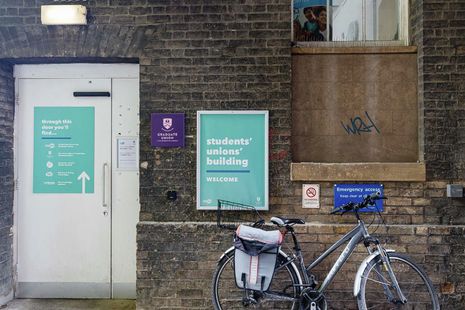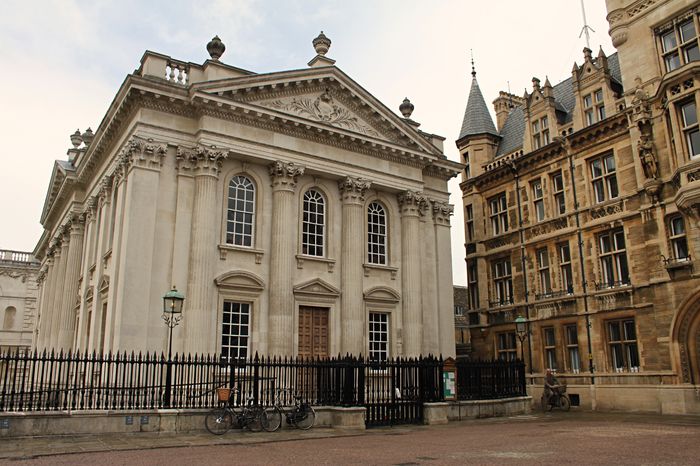‘Existing institutions and structures have failed’: report on postgraduate student experiences during Covid-19 pandemic
The report found that postgraduate students rated the University’s response to the pandemic a mean score of 58 out of 100

The Graduate Union (GU) has released a detailed report on the experiences of postgraduate students during the Covid-19 pandemic, covering issues related to fees and funding, research and teaching, student welfare, accommodation, visa and immigration, graduation and the return to Cambridge in Michaelmas 2020.
The Impact of Covid19 on Postgraduate Students report highlights student concerns about communication, mental and physical health and plans for the forthcoming academic year.
The report, which was prepared by GU President Alessandro Ceccarelli, begins by acknowledging that postgraduates “reported a general impression of inconsistency in the communication they received.”
A set of anonymous and thematically-analysed comments from 847 survey participants highlights the various issues related to communication, for instance, criticising the contrast between effective communication at a University-wide level and “poor and infrequent” faculty-level communication.
When asked to rate the University’s response to their issues during the Covid-19 outbreak from 0% to 100%, a total of 796 respondents returned a mean satisfaction level of 57.51%.
The report scrutinises various aspects of communicating to students, including limited communication from the University surrounding changes in Master’s research methodology, which led to “a sense of being neglected by the University”, and the ill-judged tone of some messaging which reminds of the University system’s responsibility to “be mindful of the dynamics of the larger social context in which education is delivered”, for instance encouraging students to seize the “‘opportunity’ to be even more ‘productive’” in a lockdown environment.
Ceccarelli told Varsity that “the level of local and national media attention on what was going to happen at Cambridge” should have “laid bare the importance of a clear and consistent communication strategy”. He suggested that, in the aftermath of this virtual Easter term, a key lesson learnt is a need for “all colleges and schools to be able to work as one when needed”, adding that “the collegiate University should make use of a consistent approach to avoid confusion for students”.
Early on in the pandemic, concerns were raised about the University’s “slow, inconsistent, and ambiguous” communication to students.
The report also highlights that “the pandemic has taken an emotional toll which in turn adversely affects their [postgraduates’] productivity”.
On the whole, survey responses suggested that “existing institutions and structures have failed to adequately support” students with pre-existing disabilities and mental health conditions. The report thus called on the University to boost resources for the Disability Resource Centre (DRC) and University Counselling Service (UCS).
One student criticised the DRC and university response to disabled graduates in claiming that their faculty, supervisor and college seemed to show no interest for their disability “in helping except to suggest [they] should de-register by the head of [their] PhD programme.” This contradicts the University’s guidance that ‘it would not be appropriate to intermit’ as PhD students ‘can be working from home very productively using University resources’.
Another student account provided criticism of funding bodies’ apparent dismissal of mental health issues as justification for delays in research requiring additional financial support during a video conference about AHRC (Arts and Humanities Research Council) funding extensions. They commented that “many of us in the Zoom were shocked that ‘Mental Health’ [...] wasn’t in [...] the 5 categories the University (and the relevant internal bodies) are using as acceptable reasons for delays to research.”
Varsity understands that Cambridge students funded by AHRC were informed by email that, following a challenge as to whether the psychological and mental health impact of the pandemic had been a relevant consideration behind extended funding and submission deadlines, the Pro-Vice-Chancellor for Education, Professor Graham Virgo, emphatically agreed that these considerations were “meant to be covered under the general heading of health considerations”. It is also understood that there was further agreement that this should be made more explicit in University documentation.
This follows support for an open letter in March, in which thousands of signatories called on research councils to extend funding for PhD students whose research has been disrupted by inability to access facilities or conduct research, as well as mental health concerns.
A University webpage dedicated to the impact of Covid-19 on funding states that funders’ flexibility ‘is dependent on the availability of financial resources’, adding that ‘funder guidance around researchers requesting costed extensions is unclear’, with most funders considering these requests solely on a case-by-case basis.
Ceccarelli recommended the Student Wellbeing website, UCS and DRC as “the best hubs for students seeking mental health support”. He continued that “we need the university to reinforce some of these services [...] to support students [...] disproportionately affected by the pandemic”.
The report also investigated the impact that Covid-19 has had on degree completion timelines, with 76% of respondents experiencing ‘significant and major delays and disruption’. The report proposes that the widespread extent of this issue ‘goes against the position of the University to have a case-by-case approach to extensions’, making the case for a blanket approach to extensions during the coronavirus pandemic - with other institutions, such as King’s College London, granting a blanket three-month extension to all postgraduate students.
The University’s policy on submission extensions has been to adopt a case-by-case approach, requiring doctoral students in particular to ‘apply around six months before [their] submission deadline when [they] will have a clear idea of the amount of additional time needed.’
One student voiced concern that even once research facilities have re-opened in accordance with protocol on postgraduate students returning to conduct research on University premises, “working in shifts for the foreseeable future will have a considerable delaying effect on lab-based research work – calling into question pivotal issues such as funding extensions, income and future career steps.
This comes as Vice-Chancellor, Stephen Toope, announced in his 2 July All Student Notice that the University has re-opened over 100 buildings for research.
The report also offers insight into accommodation issues faced by some students. One student was forced to move out of college at the start of the pandemic, intermit and then find a job so as to financially support their family abroad during the lockdown. The student accuses their college of now being ‘non-committal’ towards them entering the room ballot, leaving their PhD completion prospects in tatters. The student attacked “a system biased to the needs of privileged undergraduate students with financial support”, with another international student “concerned about the likelihood of having to self-quarantine”, describing potential costs such as those of plane tickets and a two-week hotel stay as “financially crushing”.
The UK Government has since announced a ‘travel corridors exemption list’ - a set of 59 countries and territories from, 10th July, which people can travel to England without having to self-quarantine.
In addition, the University is currently offering a package of financial provisions for postgraduate students affected academically or otherwise by the coronavirus, with the Special Hardship Fund covering ‘unexpected, direct and immediate costs as a result of Coronavirus that can be evidenced, for example cost of flights.’
However, the report raised concerns that these funds could not be accessed by students after their viva examination, creating a situation in which some students are “left in limbo”.
The report also raised issues surrounding visa applications and immigration, with a criticism of the Government’s new forthcoming post-study work visa which can allow international students to live and work in the UK for up to two years after a Masters degree, or three years after a PhD, is only applicable for students graduating from 2021 onwards. Meanwhile, students graduating in 2020 are not eligible for the scheme – as their Tier 4 visa will expire before the scheme begins in 2021.
Students also raised issues of immigration and visas relating specifically to Cambridge, due to concern about the clarity of the University’s Tier 4 intermission procedure. Students on a Tier 4 visa require a ‘sponsor’, often fulfilled by the University. However, under normal circumstances, the sponsor must report the student if their work or study is interrupted, including for intermission. The report quotes one student, who expressed concern about whether “the university [can] provide support when after the intermission application, the Home Office will ask the student to leave the UK within 60 days”.
The Home Office has stated that it “will not take enforcement action against sponsors who continue to sponsor students who are absent from their studies due to Covid-19” and that “sponsors do not need to withdraw sponsorship if a student is unable to attend for more than 60 days due to Covid-19 but intends to resume their studies”. Yet the University’s guidance for Tier 4 students in relation to Covid-19 lacks clarity. Whilst one webpage dedicated to Covid-19 recognises potential problems for those who hold Tier 4 visas. Students who are ‘unable to undertake any work on… research from home… should consider applying for non-medical intermission’, although ‘this may have implications’ for funding and visa purposes for Tier 4 visa students.
Elsewhere, University guidelines state that ‘The Home Office recognises the exceptional circumstances of the current situation and the University will continue to sponsor a student’s Tier 4 visa during a temporary disruption to studies as a result of the coronavirus outbreak.’
The report also touched on graduation and the return to Cambridge in Michaelmas 2020, with one student frustrated by “no opportunities to visit campus with [their] family and participate in a future event once [they] graduate”. University policy on graduation during the pandemic meant that students had to choose between graduating in absentia, or deferring graduation until in-person Degree Congregations can resume, posing an issue since the acquisition of a degree certificate is dependent on attendance at a virtual or in-person graduation ceremony.
The University has since clarified that alternative graduation celebrations for those who initially graduate in absence will be very similar to a normal graduation ceremony.
An international student, who holds a conditional offer to begin in Cambridge in October then expressed hope that “Cambridge will not decide/announce the decision [whether students would be returning in October] too late, because this impacts international students heavily.” It is so far known that in-person supervisions and small-scale teaching will resume in the 2020-21 academic year, with lectures moving online.
The report also highlights concerns with regards to BAME students and advises the University to consider and recognise the possibility that “protective measures like social distancing” could allow for “discrimination and harassment [to] emerge in newer forms, including being exacerbated on online platforms”, urging for this to be addressed in “an inclusive university response.”
The findings of the GU report follow concerns, raised in March, about the University’s communication to Graduate students in relation to the pandemic.
The University has been contacted for comment on the issues raised in the report.
 News / Judge Business School advisor resigns over Epstein and Andrew links18 February 2026
News / Judge Business School advisor resigns over Epstein and Andrew links18 February 2026 News / Gov grants £36m to Cambridge supercomputer17 February 2026
News / Gov grants £36m to Cambridge supercomputer17 February 2026 News / CUCA members attend Reform rally in London20 February 2026
News / CUCA members attend Reform rally in London20 February 2026 News / Union speakers condemn ‘hateful’ Katie Hopkins speech14 February 2026
News / Union speakers condemn ‘hateful’ Katie Hopkins speech14 February 2026 News / Hundreds of Cambridge academics demand vote on fate of vet course20 February 2026
News / Hundreds of Cambridge academics demand vote on fate of vet course20 February 2026










